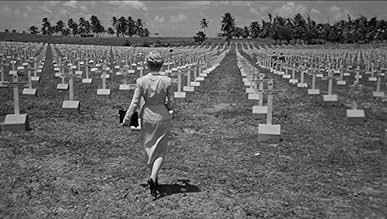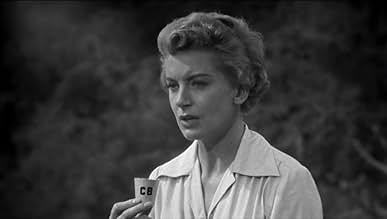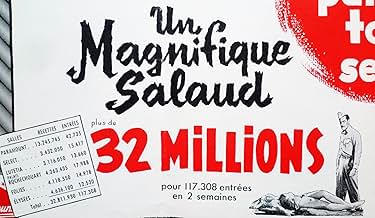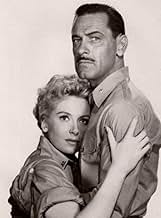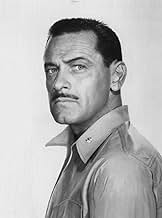IMDb RATING
6.2/10
789
YOUR RATING
In the Pacific during WWII, a Roman Catholic widow falls for a tough lieutenant colonel.In the Pacific during WWII, a Roman Catholic widow falls for a tough lieutenant colonel.In the Pacific during WWII, a Roman Catholic widow falls for a tough lieutenant colonel.
- Director
- Writers
- Stars
- Nominated for 2 Oscars
- 2 nominations total
Claude Akins
- Big Soldier
- (uncredited)
Nina Borget
- French Woman
- (uncredited)
George Brenlin
- Casualty
- (uncredited)
Lorayne Brox
- Sissie
- (uncredited)
Evelyn Cotton
- Beth
- (uncredited)
Maynard Ferguson
- Trumpet Player in Dance Scene
- (uncredited)
- Director
- Writers
- All cast & crew
- Production, box office & more at IMDbPro
Featured reviews
It was strange, but interesting watching this movie. Deborah Kerr plays an American Red Cross volunteer who pulls strings to get assigned to the South Pacific to find out the circumstances of her husband's death on Guadalcanal. Thelma Ritter (excellent as always) plays her supervisor who becomes close to Kerr and is not liking what is going on. William Holden (who is unrecognizable, except for the voice) plays sadistic Colonel Black, who is attracted in to the upper middle class Deborah Kerr. It is an unusual role for Holden since his roles typically are suave, sophisticated and the handsome leading man type of parts. Compared to movies from current adolescent-minded writers, directors and producers, it is palatable.
Considering the cast this oddly obscure WWII war drama is nothing special but is ultimately an entertaining drama.
The basic story is a standard one of a clash of values between two people with very different life experiences.
The best performance as usual comes from Thelma Ritter as a no nonsense nurse, whenever she's on screen she cuts right through the somewhat sugary dramatics with astringent fortitude.
Deborah Kerr and William Holden perform their assigned roles well but their characters are both pretty selfish and unsympathetic to involve you in their story.
The basic story is a standard one of a clash of values between two people with very different life experiences.
The best performance as usual comes from Thelma Ritter as a no nonsense nurse, whenever she's on screen she cuts right through the somewhat sugary dramatics with astringent fortitude.
Deborah Kerr and William Holden perform their assigned roles well but their characters are both pretty selfish and unsympathetic to involve you in their story.
Deborah Kerr is a war widow during the Second World War. Her husband joined the Marines, despite being an architect and thus made for the Engineers, became a paratrooper, and died on Guadalcanal. So she has joined the American Red Cross and is working under Thelma Ritter. Tough-as-nails William Holden sees her, decides he wants her, and they begin an affair preparatory to getting married. It doesn't work out well.
Somehow we are to think that these two manipulative characters matters a hill of beans, when the supporting characters have so little trouble stealing our attention whenever they're onscreen. Thelma Ritter, of course, but also Dewey Martin as a Marine whom Miss Ritter saved from prison by running a settlement house in his terrible neighborhood; Adam Williams, as the man who tells Miss Kerr off; even Michele Montau as a man-hungry widow.
George Seaton had been an auteur since before they coined the term, and this was the 1950s, so there's certainly some bloating here, with almost two hour elapsing from start to finish. He certainly offers the audience enough big shots, with Puerto Rico standing in for New Caledonia. Holden and Miss Kerr play their roles to the hilt, but I kept waiting for Frank Gorshin or Ross Bagdasarian to show up again.
Somehow we are to think that these two manipulative characters matters a hill of beans, when the supporting characters have so little trouble stealing our attention whenever they're onscreen. Thelma Ritter, of course, but also Dewey Martin as a Marine whom Miss Ritter saved from prison by running a settlement house in his terrible neighborhood; Adam Williams, as the man who tells Miss Kerr off; even Michele Montau as a man-hungry widow.
George Seaton had been an auteur since before they coined the term, and this was the 1950s, so there's certainly some bloating here, with almost two hour elapsing from start to finish. He certainly offers the audience enough big shots, with Puerto Rico standing in for New Caledonia. Holden and Miss Kerr play their roles to the hilt, but I kept waiting for Frank Gorshin or Ross Bagdasarian to show up again.
This film does capture the negativity of war! It's wonderful to see William Holden play a part where he may not be the most lovable man in the world. It's just as rewarding to see Deborah Kerr as a woman of great beauty and sexuality! I think the acting of all the cast is wonderful! The acting of the chaplain maybe a little over the top( just my opinion.) I wasn't going to watch this film all the way through, however; once I got into it I got hooked!! It is a sad film! But I can't say that any movie about war is to make a person happy!! It is about loss, but there is also some redeeming qualities in the characters. Especially at the end!!!
This movie has been on YouTube for three years but not viewed very frequently considering the stars (William Holden, Deborah Kerr & Thelma Ritter) but perhaps that is because it is a far from perfect print.
The story focuses on how the experiences of war change three of the characters as it attempts to encompass the most important aspects of life: love & faith. War strips away everything that is not important and forces people to confront their true selves, sometimes with devastating results.
This is not a grand passionate romance, and those who criticize it because it lacks these qualities are missing the point of the movie. It is not so much about relationships with others, but about one's understanding of oneself.
None of the characters are particularly likeable but as the movie progresses we gradually come to understand their life experiences and why they are as they are. All are impacted by the destruction of war of which we only see the consequences. This is not a realistic depiction of war but rather how war changes people.
The story focuses on how the experiences of war change three of the characters as it attempts to encompass the most important aspects of life: love & faith. War strips away everything that is not important and forces people to confront their true selves, sometimes with devastating results.
This is not a grand passionate romance, and those who criticize it because it lacks these qualities are missing the point of the movie. It is not so much about relationships with others, but about one's understanding of oneself.
None of the characters are particularly likeable but as the movie progresses we gradually come to understand their life experiences and why they are as they are. All are impacted by the destruction of war of which we only see the consequences. This is not a realistic depiction of war but rather how war changes people.
Did you know
- TriviaFeature-film debut of Frank Gorshin playing the uncredited role of "Harry." In the film's opening at dockside, just after Lee arrives, Kate stops to talk to Harry about obtaining a can of paint off his truck.
- GoofsThe US Army Air Force C-47 cargo planes are painted in post WWII paint scheme rather than the wartime green. When the Air Force became a separate service in 1947 the white over bare metal paint scheme as seen in the movie was adopted.
- Quotes
Chaplain Lt. (jg) Holmes: It must be wonderful to feel that one has lived such a perfect life... that forgiveness has never been necessary.
- How long is The Proud and Profane?Powered by Alexa
Details
Box office
- Gross US & Canada
- $3,900,000
- Runtime
- 1h 51m(111 min)
- Color
- Aspect ratio
- 1.85 : 1
Contribute to this page
Suggest an edit or add missing content


